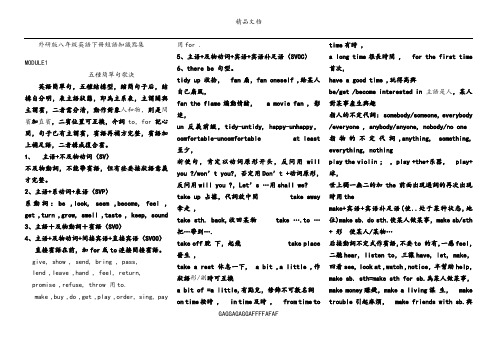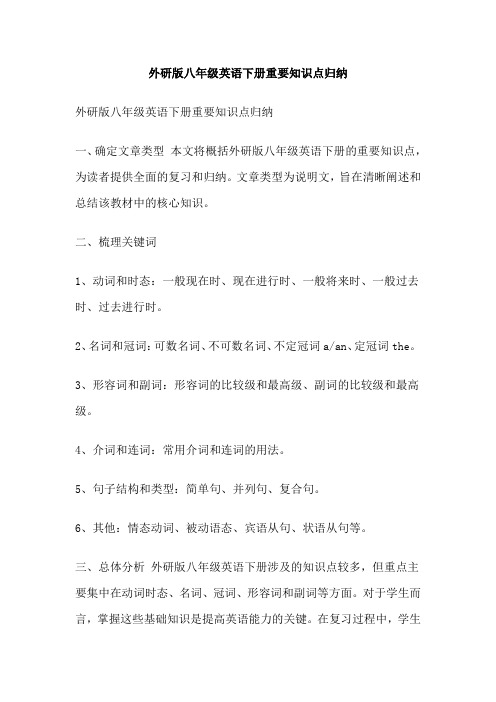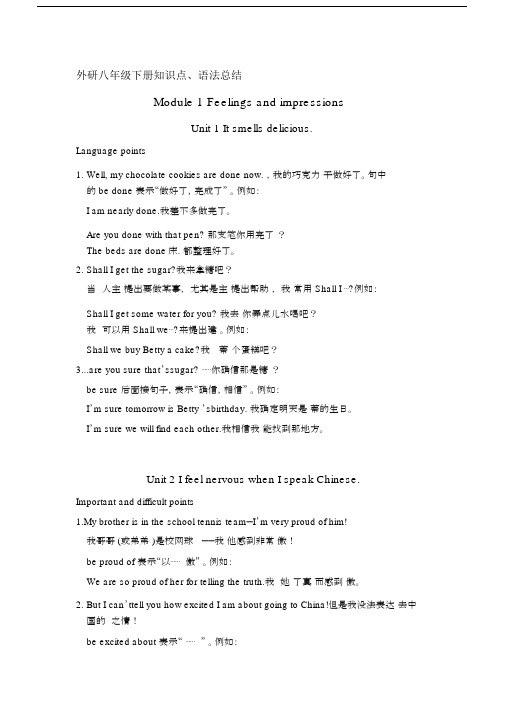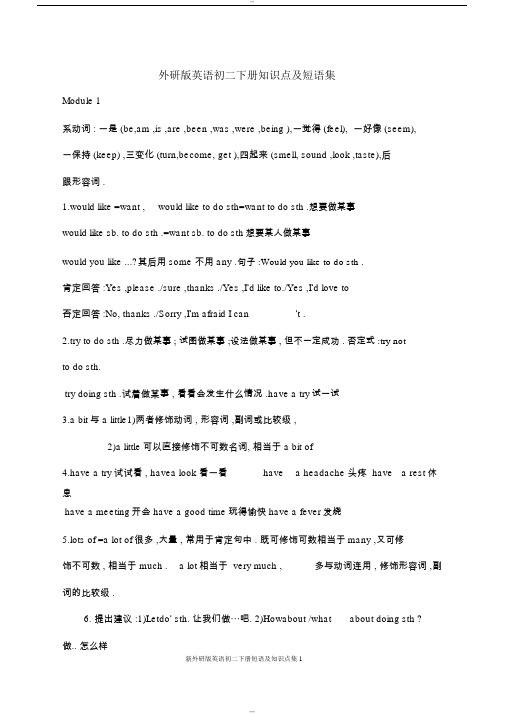最新外研版八年级英语下册知识点汇总
八年级下英语(外研版)全部知识点总复习

外研版八年級英語下冊短語知識點集MODULE1五種簡單句歌決英語簡單句,五種結構型,縮簡句子后,結構自分明,表主語狀態,即為主系表,主謂關與主謂賓,二者需分清,動作對象人和物,則是間賓加直賓,二賓位置可互換,介詞to,for記心間,句子已有主謂賓,賓語再補方完整,賓語加上補足語,二者構成復合賓。
1、主语+不及物动词(SV)不及物動詞,不能帶賓語,但有些要接狀語意義才完整。
2、主语+系动词+表语(SVP)系動詞:be ,look, seem ,become, feel , get ,turn ,grow, smell ,taste , keep, sound3、主語+及物動詞+賓語(SVO)4、主语+及物动词+间接宾语+直接宾语(SVOO)直接賓語在前,加for或to連接間接賓語。
give, show , send, bring , pass,lend ,leave ,hand , feel, return,promise ,refuse, throw 用to.make ,buy ,do ,get ,play ,order, sing, pay 用for .5、主语+及物动词+宾语+宾语补足语(SVOC)6、there be 句型。
tidy up 收拾, fan扇,fan oneself ,給某人自己扇風,fan the flame煽動情緒, a movie fan , 影迷,un反義前綴,tidy-untidy, happy-unhappy,comfortable-uncomfortable at least至少,祈使句,肯定以动词原形开头,反问用willyou ?/won’t you?,否定用Don’t +动词原形,反问用will you ?,Let’s …用shall we?take up占據,代詞放中間 take away拿走 ,take sth. back,收回某物 take ….to …把…帶到….take off脫下,起飛 take place發生 ,take a rest 休息一下, a bit ,a little ,作狀語形/副時可互換a bit of =a little,有點兒,修飾不可數名詞on time按時 , in time及時 , from time totime有時 ,a long time很長時間 , for the first time首次,have a good time ,玩得高興be/get /become interested in 主語是人,某人對某事產生興趣指人的不定代詞: somebody/someone, everybody/everyone , anybody/anyone, nobody/no one指物的不定代詞,anything, something,everything, nothingplay the violin ; ,play +the+乐器, play+球,世上獨一無二的加the前面出現過詞的再次出現時用themake+宾语+宾语补足语(使..处于某种状态,地位)make sb. do sth.使某人做某事,make sb/sth+ 形使某人/某物…后接動詞不定式作賓語,不要to 的有,一感feel,二聽hear, listen to,三讓have, let, make,四看see, look at ,watch ,notice,半幫助help,make sb. sth=make sth for sb.為某人做某事,make money賺錢,make a living謀生, maketrouble引起麻煩, make friends with sb.與GAGGAGAGGAFFFFAFAF某人交朋友, make war 開戰, make a fire 生火, make a face做鬼臉,make ..from用..制成(用被動) be made of 用..制成(用被動) make fun of 取笑,與…開玩笑, make room for 為…讓地方, make up 編造, make up one’s mind 決心,拿定主意,現在完成時:表過去發生或已經完成的某一動作,對現在造成的影響和結果,或持續到現在的動作。
新外研版八年级英语(下册)重点知识点总结

外研版八年级英语下册重点知识点Module1语法:系动词:一是(be:am,is,are,been,was,were),一觉得(feel),一好像(seem),一保持(keep),三变化(turn,become,get),四起来(smell,sound,look,taste),后跟形容词..11.三到达:arriveat(小地方),arrivein(大地方),getto=reach注意:跟home,here,there等副词时,不加介词.12.quite相当,很,相当于very,区别,quitea../quitean..而very只能放在a/an后13.with有,带有;和…一起;使用等.反义词without14.lovely:令人愉快的,可爱的修饰人或物alovelyafternoon/girllively:活泼的,生动的alivelylesson:一堂生动的课16.四个花费:take:Ittakessb.sometimetodosth./Ittooksb.sometimetodosth.Spend:Sb.spendsometime/moneyonsthSb.spendsometime/money(in)doingsth.Pay:Sb.paysomemoneyforsth.cost:sthcostsb.somemoney.,暗示.注意:词数70左右。
Ihaveanetfriend.SheisfromSydney,Australia.Thegirlisfifteenyearsold.Sheisthinwithtwo bigeyes.Shehaslongfairhair.Sheisfriendlyandoutgoing.Shealwayshasabigsmileonherface.S helikesreadingandchattingontheInternetwithherfriends.Shesaidthatreadingmadehergrowup asaperson.IfeelveryhappywhenIchatwithher.Ilikemynetfriendverymuch.IhopeIcangotoSyd neytoseeheroneday.Module2语法:现在完成时:表过去发生或已经完成的某一动作,对现在造成的影响和结果,或持续到现在的动作。
八年级下英语(外研版)全部知识点总复习

外研版八年级英语下册短语知识点集MODULE1五种简单句歌决英语简单句,五种结构型,缩简句子后,结构自分明,表主语状态,即为主系表,主谓关与主谓宾,二者需分清,动作对象人和物,则是间宾加直宾,二宾位置可互换,介词to,for记心间,句子已有主谓宾,宾语再补方完整,宾语加上补足语,二者构成复合宾。
1、主语+不及物动词(SV)不及物动词,不能带宾语,但有些要接状语意义才完整。
2、主语+系动词+表语(SVP)系动词:be ,look,seem,become, feel , get ,turn ,grow, smell,taste,keep,sound3、主语+及物动词+宾语(SVO)4、主语+及物动词+间接宾语+直接宾语(SVOO)直接宾语在前,加for或to连接间接宾语。
give, show ,send,bring , pass,lend,leave ,hand , feel,return, promise ,refuse, t hrow 用to.make ,buy,do,get,play,order, sing, pay用for .5、主语+及物动词+宾语+宾语补足语(SVOC)6、there be 句型。
tidy up收拾, fan扇,fan oneself ,给某人自己扇风, fan the flame煽动情绪, a movie fan,影迷,un反义前缀,tidy-untidy, happy-unhappy,comfortable-uncomfortable at least至少,祈使句,肯定以动词原形开头,反问用will you?/won’t you?,否定用Don’t+动词原形,反问用will you?,Let’s …用shall we?takeup占据,代词放中间take away 拿走,takesth. back,收回某物take ….to …把…带到….take off脱下,起飞take place发生,take a rest 休息一下, abit,a little ,作状语形/副时可互换a bit of=a little,有点儿,修饰不可数名词on time按时,in time及时,from time to time有时,a long time很长时间,forthe first time首次,have a good time ,玩得高兴be/get /become interested in 主语是人,某人对某事产生兴趣指人的不定代词:somebody/someone,everybody/everyone ,anybody/anyone, nobody/no one指物的不定代词,anything,something,everything, nothingplaythe violin; ,play+the+乐器,play+球,世上独一无二的加the前面出现过词的再次出现时用themake+宾语+宾语补足语(使..处于某种状态,地位)make sb.do sth.使某人做某事,make sb/sth+ 形使某人/某物…后接动词不定式作宾语,不要to 的有,一感feel,二听hear,listen to,三让have,let,make,四看see,look at ,watch ,notice,半帮助help,make sb. sth=makesth for sb.为某人做某事,makemoney赚钱,make aliving谋生,maketrouble引起麻烦,makefriendswith sb.与某人交朋友,make war开战,make afire生火,make aface做鬼脸,make..from用..制成(用被动)be madeof用..制成(用被动)make funof 取笑,与…开玩笑,make room for 为…让地方, makeup 编造,make upone’smind决心,拿定主意,现在完成时:表过去发生或已经完成的某一动作,对现在造成的影响和结果,或持续到现在的动作。
外研版八年级英语下册重要知识点归纳

外研版八年级英语下册重要知识点归纳外研版八年级英语下册重要知识点归纳一、确定文章类型本文将概括外研版八年级英语下册的重要知识点,为读者提供全面的复习和归纳。
文章类型为说明文,旨在清晰阐述和总结该教材中的核心知识。
二、梳理关键词1、动词和时态:一般现在时、现在进行时、一般将来时、一般过去时、过去进行时。
2、名词和冠词:可数名词、不可数名词、不定冠词a/an、定冠词the。
3、形容词和副词:形容词的比较级和最高级、副词的比较级和最高级。
4、介词和连词:常用介词和连词的用法。
5、句子结构和类型:简单句、并列句、复合句。
6、其他:情态动词、被动语态、宾语从句、状语从句等。
三、总体分析外研版八年级英语下册涉及的知识点较多,但重点主要集中在动词时态、名词、冠词、形容词和副词等方面。
对于学生而言,掌握这些基础知识是提高英语能力的关键。
在复习过程中,学生应结合教材中的例句和练习题,深入理解各个知识点的用法和意义。
四、具体展开1、动词和时态:熟练掌握一般现在时(表示习惯或经常发生的动作)、现在进行时(表示正在进行的动作)、一般将来时(表示将来要发生的动作)、一般过去时(表示过去发生的动作)和过去进行时(表示过去正在进行的动作)。
注意动词的形式变化,如第三人称单数、过去分词等。
2、名词和冠词:理解可数名词和不可数名词的区别,掌握不定冠词a/an和定冠词the的用法。
注意名词的数与量的搭配,如a piece of paper, two pieces of paper等。
3、形容词和副词:掌握形容词的比较级和最高级(如big-bigger-biggest),了解副词的比较级和最高级(如fast-faster-fastest)的构成和用法。
同时,要学会使用形容词和副词来描述事物和动作,如She sings beautifully. The car drives quickly.4、介词和连词:掌握常用介词的用法,如in, on, at, for等,以及常用连词的用法,如and, but, or等。
外研版八年级英语下册重要知识点归纳

八年级下册英语重要知识点归纳M1重要语法:感官性系统词:feel(摸起来)、look(看起来)、smell(闻起来)、taste(尝起来)sound(听起来),后接形容词作表语,不能接副词。
构成疑问句或否定句要借助助动词。
The silk dress feels soft.The flowers look very beautiful.Does it smell nice?be noisy.The song doesn’t sound2. What a d elicious smell!多么香啊!对名词或名词短语感叹用what感叹句结构:①What+ a/an+形容词+单数可数名词+(主语+谓语)!What an interesting book it is!②What+形容词+不可数名词/复数名词+(主语+谓语)!What bad weather it is today!What good students they are!对形容词、副词或动词感叹用how③ How +形容词/副词+主语+谓语!How fast he is running!How delicious it smells!How I miss the days we spent together!我多么怀念我们一起度过的日子!句子:恐怕……I’m afraid he has no time today.3.I’m afraid+4. be d one做好了Is your homework d one?你的作业做好了吗?Dinner is done!晚饭做好了!5. have a try试一试;尝一尝6.have a sweet tooth喜好甜食7.thanks for=thank you for+名词/动词-ing。
因……而感谢你。
Thanks for your help.=Thanks for helping me .Thank you for inviting me to your party.…的来信8. hear from…=get /receive aletter from收到……o sth.迫不及待去做某事I can’t wait to see you.9.can’t wait to d10.人+ spend+时间(in)d oing sth.。
八年级下英语(外研版)全部知识点总复习

八年级英语下册短语知识点集MODULE1五种简单句歌决英语简单句,五种结构型,缩简句子后,结构自分明,表主语状态,即为主系表,主谓关与主谓宾,二者需分清,动作对象人和物,则是间宾加直宾,二宾位置可互换,介词to,for记心间,句子已有主谓宾,宾语再补方完整,宾语加上补足语,二者构成复合宾。
1、主语+不及物动词(SV)不及物动词,不能带宾语,但有些要接状语意义才完整。
2、主语+系动词+表语(SVP)系动词:be ,look, seem ,become, feel , get ,turn ,grow, smell ,taste , keep, sound3、主语+及物动词+宾语(SVO)4、主语+及物动词+间接宾语+直接宾语(SVOO)直接宾语在前,加for或to连接间接宾语。
give, show , send, bring , pass, lend ,leave ,hand , feel, return, promise ,refuse, throw 用to.make ,buy ,do ,get ,play ,order, sing, pay用for .5、主语+及物动词+宾语+宾语补足语(SVOC)6、there be 句型。
tidy up 收拾,fan扇,fan oneself ,给某人自己扇风,fan the flame煽动情绪, a movie fan , 影迷,un反义前缀,tidy-untidy, happy-unhappy,comfortable-uncomfortableat least至少,祈使句,肯定以动词原形开头,反问用will you ?/won’t you?,否定用Don’t +动词原形,反问用will you ?,Let’s …用shall we?take up占据,代词放中间take away拿走,take sth. back,收回某物take ….to …把…带到….take off脱下,起飞take place发生,take a rest 休息一下,a bit ,a little ,作状语形/副时可互换a bit of =a little,有点儿,修饰不可数名词on time按时, in time及时, from time to time有时,a long time很长时间, for the first time首次,have a good time ,玩得高兴be/get /become interested in 主语是人,某人对某事产生兴趣指人的不定代词:somebody/someone, everybody /everyone , anybody/anyone, nobody/no one 指物的不定代词,anything, something, everything, nothingplay the violin ; ,play +the+乐器,play+球,世上独一无二的加the前面出现过词的再次出现时用themake+宾语+宾语补足语(使..处于某种状态,地位)make sb. do sth.使某人做某事,make sb/sth + 形使某人/某物…后接动词不定式作宾语,不要to 的有,一感feel,二听hear, listen to,三让have, let, make,四看see, l ook at ,watch ,notice,半帮助help,make sb. sth=make sth for sb.为某人做某事,make money赚钱,make a living谋生,make trouble引起麻烦,make friends with sb.与某人交朋友,make war 开战,make a fire生火,make a face做鬼脸,make ..from用..制成(用被动)be made of用..制成(用被动)make fun of 取笑,与…开玩笑,make room for 为…让地方,make up 编造,make up one’s mind 决心,拿定主意,现在完成时:表过去发生或已经完成的某一动作,对现在造成的影响和结果,或持续到现在的动作。
(完整word版)外研八年级下册知识点、语法总结.docx

外研八年级下册知识点、语法总结Module 1 Feelings and impressionsUnit 1 It smells delicious.Language points1.Well, my chocolate cookies are done now. ,我的巧克力干做好了。
句中的 be done 表示“做好了,完成了”。
例如:I am nearly done.我差不多做完了。
Are you done with that pen? 那支笔你用完了?The beds are done床.都整理好了。
2.Shall I get the sugar?我来拿糖吧?当人主提出要做某事,尤其是主提出帮助,我常用 Shall I ⋯?例如:Shall I get some water for you? 我去你弄点儿水喝吧?我可以用 Shall we⋯?来提出建。
例如:Shall we buy Betty a cake?我蒂个蛋糕吧?3...are you sure that’ssugar? ⋯⋯你确信那是糖?be sure 后面接句子,表示“确信,相信”。
例如:I’m sure tomorrow is Betty ’sbirthday. 我确定明天是蒂的生日。
I’m sure we will find each other.我相信我能找到那地方。
Unit 2 I feel nervous when I speak Chinese.Important and difficult points1.My brother is in the school tennis team—I’m very proud of him!我哥哥 (或弟弟 )是校网球——我他感到非常傲!be proud of 表示“以⋯⋯傲”。
例如:We are so proud of her for telling the truth.我她了真而感到傲。
新外研版英语八年级下册知识点与短语

外研版英语初二下册知识点及短语集Module 1系动词 : 一是 (be,am ,is ,are ,been ,was ,were ,being ),一觉得(feel),一好像(seem),一保持 (keep) ,三变化(turn,become, get ),四起来(smell, sound ,look ,taste),后跟形容词 .1.would like =want , would like to do sth=want to do sth .想要做某事would like sb. to do sth .=want sb. to do sth想要某人做某事would you like ...?其后用some不用any .句子:Would you like to do sth .肯定回答 :Yes ,please ./sure ,thanks ./Yes ,I’d like to./Yes ,I’d love to否定回答 :No, thanks ./Sorry ,I’m afraid I can’t .2.try to do sth .尽力做某事;试图做某事;设法做某事,但不一定成功.否定式:try notto do sth.try doing sth .试着做某事,看看会发生什么情况.have a try试一试3.a bit与a little1)两者修饰动词,形容词,副词或比较级,2)a little可以直接修饰不可数名词, 相当于 a bit of4.have a try试试看, havea look 看一看have a headache 头疼 have a rest休息have a meeting开会have a good time玩得愉快have a fever发烧5.lots of =a lot of很多,大量,常用于肯定句中.既可修饰可数相当于many ,又可修饰不可数 , 相当于 much . a lot相当于very much ,多与动词连用,修饰形容词,副词的比较级 .6. 提出建议 :1)Letdo’ sth. 让我们做⋯吧. 2)Howabout /what about doing sth ?做.. 怎么样3)Why not do sth ?为什么不⋯ ?4)Would you like to do你愿意做⋯?.吗?5)Shall we do我们⋯?做⋯好吗?6)You’ d better(not) do ..你最好(不)做某事.7.Thanks for sth. =Thank you for sth.因⋯而感谢.后V+ing . Thanks to幸亏,由于,归功于 .8.leave a message留个口信 , take/have a message for sb.给某人带个口信 .9.hear from sb.=get /receive a letter from sb . 收到⋯的来信 hear about /of得悉,听说Hear out听完 hear to同意10.can’ t wait to do sth . 迫不及待做某事wait for等候⋯,后接等待的对象 ,名词或代词wait to do sth .等着做某事11.三到达 :arrive at ( 小地方 ),arrive in( 大地方 ),get to=reach 注意 : 跟home ,here ,there等副词时 ,不加介词 .12.quite相当 , 很, 相当于 very, 区别 , quite a ../quite an .. 而 very只能放在 a /an后13.with有,带有 ;和⋯一起;使用等 . 反义词 without14. 穿 :dress , 后跟人 ,dress oneself, dress sb . put on穿上,强调动作,wear ,穿着,强调状态 .15.be sure确信,相信be sure of /about sth .相信/对某事有把握16. 四个花费 :take:It takes sb. some time to do sth. /It took sb .some time todo sth .Spend :Sb. spend some time on sth ./ Sb spend some time (in) doing sth/Sb.spend money on sth .Pay:Sb. pay some money for sth.cost :sth cost sb .some money .17.四个也 :as well肯定,句末,不用逗号too,肯定,句末,逗号可有可无.either:否定句末 , also ,肯定句中,行前be后.18.proud .adj. be proud of为⋯而感到骄傲be proud to do sth .做某事很自豪 .pride. n. take pride in为⋯感到自⋯豪.;the pride of的骄傲⋯.19.How do you feel about对⋯感⋯?觉如何?与How do you like⋯?20.at first起初,开始,常位于句首或句末,反义词.at last最后,终于first of all ,首先,用作插入语,说明顺序,后接next ,then , at first ,指刚开始做某事的时候 , 暗示后来的情况有所改变.21.few /a few修饰可数名词,little /a little修饰不可数名词,有a表示有,没有a表示没有 .22.way的短语:in this way用这种方式, in the right way用正确的方法, the wayof 做 .. 的方式in the way 阻碍 , 妨碍 ; on the way to在去⋯的路上 by the way顺便说一下 .23.be afraid of害怕 , 后接名词 ,代词或动名词 be afraid to do sth .害怕做某事24.each other互相 25.be nervous about对⋯感到紧张26. 问外貌 :What+do/does /did + 主语 +look like ?问性格 :What +be +主语 +like ?27.be friendly to sb. 对某人友好 -28.be good at =do well in 擅长 , 后跟 doing sth .或名词。
- 1、下载文档前请自行甄别文档内容的完整性,平台不提供额外的编辑、内容补充、找答案等附加服务。
- 2、"仅部分预览"的文档,不可在线预览部分如存在完整性等问题,可反馈申请退款(可完整预览的文档不适用该条件!)。
- 3、如文档侵犯您的权益,请联系客服反馈,我们会尽快为您处理(人工客服工作时间:9:00-18:30)。
最新外研版英语八年级下册知识点总结Module 1 Feelings and impressionsUnit 11. What a delicious smell? Smell:一股气味(可数名词)_____ good advice! It’s so helpful to us. (wh at / How)_____ interesting the story is! (What / How)2. nice:adj. 美味的,友好的,令人愉快的nice weather: 好天气be nice to sb.:对某人友好a nice trip: 一次令人愉快的旅行The cookie tastes nice. 这块饼干尝起来美味。
3. would like 比want 语气更委婉。
----Would you like to stay here with us?---- Yes, I’d like / love to.4. lovely: 令人愉快的,可爱的修饰人或物a lovely afternoon / girllively: 活泼的,生动的a lively lesson:一堂生动的课5. I’m afraid that +从句: 恐怕(表示歉意或让对方失望的情况)I’m afraid that I can’t come to your party tomorrow.6. 1) a bit = a little:有点儿,有点后接/形容词/副词形容词/副词的比较级I feel a bit thirsty now.After the rain, people feel a bit / a little cooler.2) a little + 不可数名词:There is a little time left.a bit of + 不可数名词:There is a bit of water in the bottle.7. have a try: 试一试have a / an + 名词have a swim:游泳have a break:休息have a shower:洗沐浴8. I have a sweet tooth. 我喜欢吃甜食。
9. be done: 做好了,完成了done: adj. 做好了的,完成了10. be sure + 从句:Are you sure what you said?Be sure of / about sth.: 对……确信I’m sure of / about the telephone number.be sure (not) to do. Sth.: 确保/ 务必(不)做某事Be sure not to miss the early bus.11. lucky day:幸运日You’re a lucky boy. 你是一个幸运儿。
Good luck to you. 祝你好运。
Unit 21. thanks for = thank you for: 因……而感谢你Thank you for your help.Thank you for sending me photos.2. message: 口信、信息(可数名词)take a message:捎个口信leave a message:留信Information: 信息(不可数名词)a piece of information ,some information3. hear from sb.= get / receive a letter from sb. : 收到某人的来信I heard from my uncle last week.= I got / received a letter from my uncle last week.4. can’t wait to dosth. : 等不及/ 迫不及待做某事I can’t wait to open the present.5. quite:1) quite a / an + 形容词+ 名词quite a nice boy:一个相当好的男孩。
2) quite 修饰动词时放在动词前He quite likes maths. 他很喜欢数学。
very:1) a very + 形容词+ 名词 a very nice boy2) very 与much合在一起修饰动词时,位于句末。
He likes English very much.6. sound like: 听起来(像)The music sounds very beautiful.7. 1) sb. spend some time/money (in) doing sth.:某人花费时间/钱做某事Don’t spend too much time (in) playing computer games.2) sb. spend some time / money on sth. :某人花时间/ 钱在某事/某物上I spent ten yuan on this book.Many people spned their free time on their hobbies.8. be proud of sb. / sth. : 以某人/ 某事为自豪Parents are proud of their children.We’re proud of our country.9. be good at sth. / doing sth.= do well in sth. / doing sth. 擅长某事/ 做某事I’m good at English / swimming.= I do well in English / swimming.10. How do you feel about…?= What do you think of …?= How do you like…?How do you feel about the film?= What do you think of the film?11. in: 在多久之后,常用于将来时,对其提问用how soon--- How soon will you leave Beijing?--- I’ll come back in three days.12. how to do things: 疑问词+ 不定式,在句中可作主语、宾语、表语1) I don’t knowwhat to do.= I don’t knowwhat I should do. (作宾语)疑问词加不定式作宾语时可以转换成宾语从句。
2) When to hold the meeting hasn’t been decided. (作主语)3) His dream is how to be a good scientist. (作表语)4) I don’t knowwhat to do.= I don’t know how to do it.13. 1) be afraid of sb. / sth. : 害怕某人/某物I’m afraid of doctors / dogs.2) be afraid of doing sth.: 害怕做某事I’m afraid of flying / going out at night.3) be afraid to do sth.: 害怕做某事I’m afraid to swim across the river.4) I’m afraid that: 恐怕I’m afraid that you must study hard.语法:表示感觉和知觉的系动词也称感官系动词1. 五个表示感觉和知觉的系动词与眼、耳、口、鼻、手相关系。
look, sound, taste, smell, feel + 形容词He feels tired after work.2. 感官系动词后可接介词like, like后常接名词。
His idea sounds like fun .3. 感官系动词的句型结构与be 不同,其否定形式和疑问形式要借助动词do。
The food tastes delicious.变成否定句→ The food doesn’ttaste delicious.变成一般疑问句→ Does the food taste delicious?4. 持续系动词,用来表示主语继续或保持一种状况或态度,主要有keep, remain, stayThe weather will keep warm for 7 days.5. 变化系动词有become, grow, turn, get, go等。
书面表达在英语学习中,与北京阳光中学的同学朝夕相处,其中Daniel的善良和助人为乐等优秀品质给我们留下了深刻的印象。
请根据下面提示,用英语写一篇短文。
提示:1.Personality: helpful—help old woman cross the roadkind—work at the Helping Hands Clubcreative—creative a TV programme点拨:人物介绍(年龄、外貌、身份、性格)→ 典型事例(性格、品质)→人物评价(喜爱、夸赞)My friend DanielMy friend Daniel comes from Beijing Sunshine Secondary School. He has a round face and often wears a pair of glasses. He is good at playing computer games, but he dislikes sports. He has many good personal qualities. He is helpful. He often helps his classmates with the homework. He also helps old woman cross the road. He is kind to others. He works at the Helping Hands Club. He is creative. For example, he can create a TV programme. He is generous to his friends. He likes to share his things with them. So I want to be a person like Daniel from now on and get on well with everyone.Module 2 ExperiencesUnit 11. 1) enter = take part in = join in 参加enter a competition: 参加比赛2) enter = come / go into 进入Please enter the classroom.2. ever: 曾经、从来,用于现在完成时的一疑问句、否定句。
